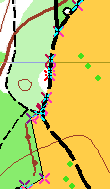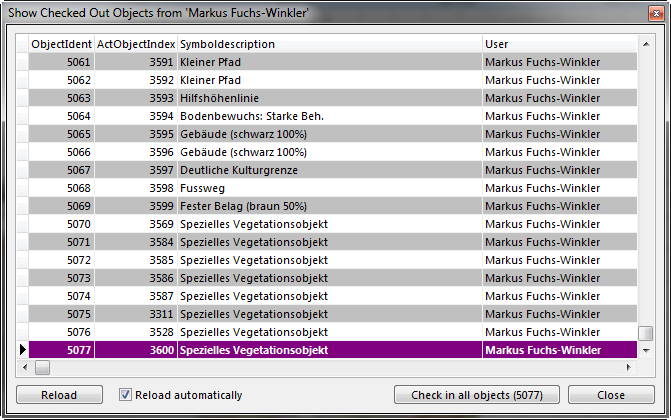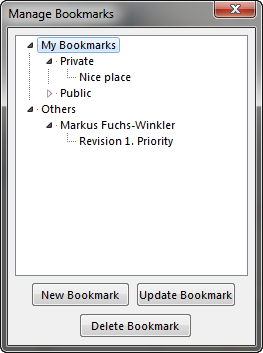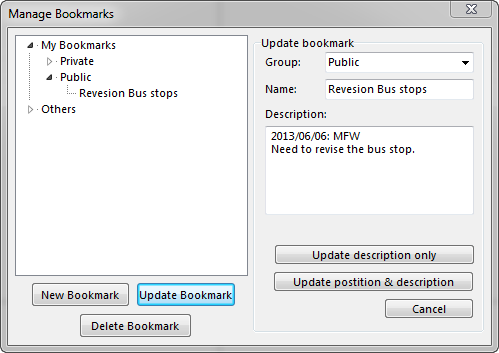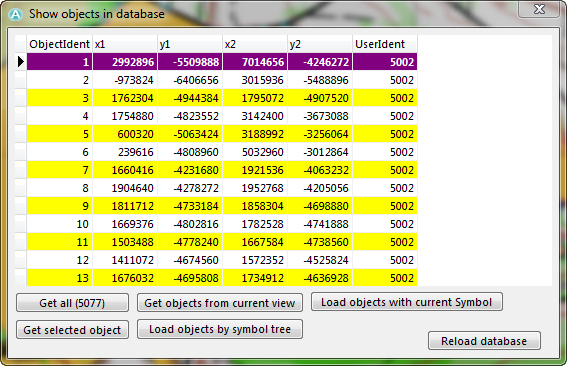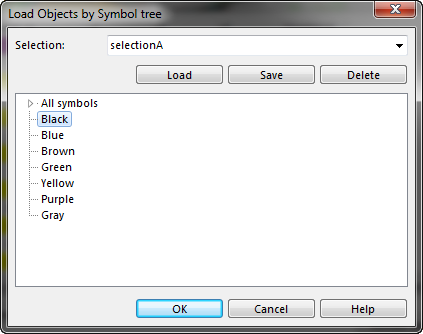Working on a CSA Project: Difference between revisions
No edit summary |
|||
| (21 intermediate revisions by 3 users not shown) | |||
| Line 1: | Line 1: | ||
[[Category:Client Server Architecture]][[File:Ent40px.PNG|This function is only available in the OCAD 11 Enterprise Edition.|link=https://www.ocad.com/en/products/ocad-for-cartography]] | [[Category:Client Server Architecture]][[File:Ent40px.PNG|This function is only available in the OCAD 11 Enterprise Edition.|link=https://www.ocad.com/en/products/ocad-for-cartography]] | ||
After the '''[[Create a New CSA Project|Creation of a New CSA Project]]''' | After the '''[[Create a New CSA Project|Creation of a New CSA Project]]''' and '''[[First Loading of CSA Project|First loading of a New CSA Project]] you can start working on it. | ||
==Editing== | ==Editing== | ||
To edit an object in the client server mode OCAD objects must be checked out and should be checked in after the edit. The check out exclusively locks the object to you and no other user is able to change something on this object. The objects stays checked out for you even if you close OCAD. This means that nobody will be able to change or delete the objects you have checked out. | |||
'''Important:''' For some functions OCAD need to be able to completely load and check out all objects by a single user to execute the function. If this is not possible the function execution fails | |||
[[File:Hint.jpg|hint]] Make sure that you have the '''[[Rights Management|Right]]''' to edit objects. | |||
===Check Out Selected Objects=== | ===Check Out Selected Objects=== | ||
# Select an object you want to edit. '''[[Select#Select_and_Edit_Multiple_Objects|Select Multiple Objects]]''' to edit more than one object. | # Select an object you want to edit. '''[[Select#Select_and_Edit_Multiple_Objects|Select Multiple Objects]]''' to edit more than one object. | ||
# Click the [[File:Icon_CheckOut.PNG]] '''Check out Selected Objects''' icon in the '''Client Server''' toolbar. The selected objects are now checked out, which means that nobody else is allowed to make modifications on them at the moment. | # Click the [[File:Icon_CheckOut.PNG]] '''Check out Selected Objects''' icon in the '''Client Server''' toolbar. The selected objects are now checked out, which means that nobody else is allowed to make modifications on them at the moment. | ||
# Edit the checked out objects or, if you are creating new objects, draw them. | # Edit the checked out objects or, if you are creating new objects, draw them. | ||
If an object is not checked out it is visually marked with crosses on the object. | |||
[[File:CSA_CheckOutExample.png]] | |||
===Check In Selected Objects=== | ===Check In Selected Objects=== | ||
When finished, you have to check in the objects again. | When finished, you have to check in the objects again. | ||
# Select all edited or drawn objects and click the [[File:Icon_CheckIn.PNG]] '''Check in Selected Objects''' icon from the '''Client Server''' toolbar. | # Select all edited or drawn objects and click the [[File:Icon_CheckIn.PNG]] '''Check in Selected Objects''' icon from the '''Client Server''' toolbar. | ||
[[File:Hint.jpg|hint]] Check out and check in is not connected to save changes. Changes are saved immediately. | |||
To view all checked out objects and also objects that are checked out by other project members click on the | |||
[[File:Icon_ShowCheckedOutObjects.PNG]] '''Show Checked Out Objects''' icon. | |||
[[File:CheckedOutObjects.PNG]] | |||
This opens the '''Show Checked Out Objects''' dialog from your currently logged in user. This dialog can be left open and you can choose a objects by clicking on it. This automatically centers the screen view on the selected object. The dialog automatically refreshes itself if the checkbox is ticked every 30 seconds when the dialog is not active. | |||
== | ===Delete Objects in Database=== | ||
Click the [[File:Icon_DeleteObjectsInDatabase.PNG]] '''Delete Objects in Database''' button or press the '''Delete''' key to delete an object from the server. Note that you first have to check out the object which you want to delete. If you delete an object with '''Alt''' and '''Delete''' key, the object will be deleted only in the current view but will remain on the server. By clicking the [[File:Icon_GetObjectsFromCurrentView.PNG]] '''Get Objects from Current View''' button it will show up again. | |||
An object which is not checked out cannot be edited and is indicated with red '''[[Vertices]]''' when selected. | |||
==Offline Work== | ==Offline Work== | ||
It is possible to save parts of the project in a local offline file and sync them after working on it with the CSA-Project again. | It is possible to save parts of the project in a local offline file and sync them after working on it with the CSA-Project again. | ||
# Get all objects (with the [[File:Icon_GetObjectsFromCurrentView.PNG]] '''[[ | # Get all objects (with the [[File:Icon_GetObjectsFromCurrentView.PNG]] '''[[Working on a CSA Project #Get Objects|Get Objects from Current View]]''' function from the '''Client Server''' toolbar) you want to work on offline. | ||
# Check them out (Select them and click the [[File:Icon_CheckOut.PNG]] '''[[Working on a CSA Project#Check Out Selected Objects|Check Out Selected Objects]]''' icon from the '''Client Server''' toolbar.) | # Check them out (Select them and click the [[File:Icon_CheckOut.PNG]] '''[[Working on a CSA Project#Check Out Selected Objects|Check Out Selected Objects]]''' icon from the '''Client Server''' toolbar.) | ||
# Click the [[File:Icon_SaveForOfflineWork.PNG]] '''Save for Offline Work''' icon in the '''Client Server''' toolbar. | # Click the [[File:Icon_SaveForOfflineWork.PNG]] '''Save for Offline Work''' icon in the '''Client Server''' toolbar. | ||
| Line 41: | Line 47: | ||
# Open the offline copy with the '''[[File#Open|Open]]''' command in the '''[[File]]''' menu. | # Open the offline copy with the '''[[File#Open|Open]]''' command in the '''[[File]]''' menu. | ||
# You can now work on this file. | # You can now work on this file. | ||
# | # To resync the file open it. | ||
# Select the CSA-Project in the table of the ''' | # Click the [[File:Icon_ConnectDisconnect.PNG]] '''Load and Manage Client Server Projects''' icon in the '''Client Server''' toolbar. | ||
# Select the CSA-Project in the table of the '''Load and Manage Client Server Projects''' dialog, check the '''Resync current open project after offline work''' option and click the '''Load selected project''' button. | |||
# OCAD will ask you if you want to sync the offline file with the CSA-Project. Click the '''Yes''' button. Note that this synchronization cannot be made undone. | # OCAD will ask you if you want to sync the offline file with the CSA-Project. Click the '''Yes''' button. Note that this synchronization cannot be made undone. | ||
# OCAD syncs changes as well as new objects and will tell you, when it is finished. Then it will close the offline copy. | # OCAD syncs changes as well as new objects and will tell you, when it is finished. Then it will close the offline copy. | ||
#: '''Important''': | |||
#: * Offline changes on objects are only resynced to the server if the objects where checked out by you. Otherwise the change on the object is ignored. | |||
#: * Only the latest for the user saved offline work is possible to be resynced. Earlier saved versions can’t be resynced anymore. | |||
#: * Newly added objects are always added to the server during resync | |||
# Load the CSA-Project again. | # Load the CSA-Project again. | ||
# The synced objects of the offline copy are not checked in yet. Check them in again ([[File:Icon_CheckIn.PNG]] '''[[Working on a CSA Project#Check In Selected Objects|Check In Selected Objects]]'''). | # The synced objects of the offline copy are not checked in yet. Check them in again ([[File:Icon_CheckIn.PNG]] '''[[Working on a CSA Project#Check In Selected Objects|Check In Selected Objects]]'''). | ||
[[File:Hint.jpg]] The offline copy is now disconnected from the project. For another session of offline work a new offline file must be created. The file can be deleted after resync. | |||
==Maintenance== | ==Maintenance== | ||
The [[File:Icon_DoDatabaseMaintenance.PNG]] '''Do Database Maintenance''' function in the '''Client Server''' toolbar cleans up the database. | The [[File:Icon_DoDatabaseMaintenance.PNG]] '''Do Database Maintenance''' function in the '''Client Server''' toolbar cleans up the database and optimizes it. | ||
==Bookmarks== | ==Bookmarks== | ||
| Line 86: | Line 98: | ||
* Last update of the object | * Last update of the object | ||
* User which made the last update | * User which made the last update | ||
* Object status (checked in / checked out) | |||
* A list of all changes made on the object | * A list of all changes made on the object | ||
[[File:ObjectHistory.PNG]] | [[File:ObjectHistory.PNG]] | ||
==Backup and Restore== | |||
Projects can be backed up and restored with the buttons [[File:BackupRestore.PNG]] in the Client Server Toolbar through the client to a local zip file. Backup can be done by any user on the project. To restore you need the right to restore project. | |||
==Advanced object loading== | |||
By clicking on the Get Objects button [[File:Icon_GetObjectsFromCurrentView.PNG]] while holding the alt key an advanced object loading dialog is opened. Within this dialog you have the possibility to load objects by current selected Symbol, download the entire map or load them by symbol tree groups. | |||
Selections of symbol tree groups can be saved and reloaded in order to get the same result again. Note that not the entire map is loaded but only the objects from the current view. | |||
[[File:AdvancedLoading.PNG]][[File:AdvancedLoading2.PNG]] | |||
---- | ---- | ||
Last page: '''[[ | Last page: '''[[First Loading of CSA Project]]'''<br /> | ||
Next page: '''[[Raster Background Maps in CSA]]'''<br /> | Next page: '''[[Raster Background Maps in CSA]]'''<br /> | ||
Back to the '''[[Client Server Architecture]]''' page.<br /> | Back to the '''[[Client Server Architecture]]''' page.<br /> | ||
An overview about all pages dealing with the '''[[Client Server Architecture]]''' can be found in the corresponding category (see below for the link). | An overview about all pages dealing with the '''[[Client Server Architecture]]''' can be found in the corresponding category (see below for the link). | ||
Latest revision as of 11:39, 30 January 2014
After the Creation of a New CSA Project and First loading of a New CSA Project you can start working on it.
Editing
To edit an object in the client server mode OCAD objects must be checked out and should be checked in after the edit. The check out exclusively locks the object to you and no other user is able to change something on this object. The objects stays checked out for you even if you close OCAD. This means that nobody will be able to change or delete the objects you have checked out.
Important: For some functions OCAD need to be able to completely load and check out all objects by a single user to execute the function. If this is not possible the function execution fails
![]() Make sure that you have the Right to edit objects.
Make sure that you have the Right to edit objects.
Check Out Selected Objects
- Select an object you want to edit. Select Multiple Objects to edit more than one object.
- Click the
Check out Selected Objects icon in the Client Server toolbar. The selected objects are now checked out, which means that nobody else is allowed to make modifications on them at the moment.
- Edit the checked out objects or, if you are creating new objects, draw them.
If an object is not checked out it is visually marked with crosses on the object.
Check In Selected Objects
When finished, you have to check in the objects again.
- Select all edited or drawn objects and click the
Check in Selected Objects icon from the Client Server toolbar.
![]() Check out and check in is not connected to save changes. Changes are saved immediately.
Check out and check in is not connected to save changes. Changes are saved immediately.
To view all checked out objects and also objects that are checked out by other project members click on the
Show Checked Out Objects icon.
This opens the Show Checked Out Objects dialog from your currently logged in user. This dialog can be left open and you can choose a objects by clicking on it. This automatically centers the screen view on the selected object. The dialog automatically refreshes itself if the checkbox is ticked every 30 seconds when the dialog is not active.
Delete Objects in Database
Click the Delete Objects in Database button or press the Delete key to delete an object from the server. Note that you first have to check out the object which you want to delete. If you delete an object with Alt and Delete key, the object will be deleted only in the current view but will remain on the server. By clicking the
Get Objects from Current View button it will show up again.
An object which is not checked out cannot be edited and is indicated with red Vertices when selected.
Offline Work
It is possible to save parts of the project in a local offline file and sync them after working on it with the CSA-Project again.
- Get all objects (with the
Get Objects from Current View function from the Client Server toolbar) you want to work on offline.
- Check them out (Select them and click the
Check Out Selected Objects icon from the Client Server toolbar.)
- Click the
Save for Offline Work icon in the Client Server toolbar.
- The Save As dialog appears. Browse a location and enter a name for the offline copy, then click the Save button.
- The CSA-Project closes automatically.
- Open the offline copy with the Open command in the File menu.
- You can now work on this file.
- To resync the file open it.
- Click the
Load and Manage Client Server Projects icon in the Client Server toolbar.
- Select the CSA-Project in the table of the Load and Manage Client Server Projects dialog, check the Resync current open project after offline work option and click the Load selected project button.
- OCAD will ask you if you want to sync the offline file with the CSA-Project. Click the Yes button. Note that this synchronization cannot be made undone.
- OCAD syncs changes as well as new objects and will tell you, when it is finished. Then it will close the offline copy.
- Important:
- * Offline changes on objects are only resynced to the server if the objects where checked out by you. Otherwise the change on the object is ignored.
- * Only the latest for the user saved offline work is possible to be resynced. Earlier saved versions can’t be resynced anymore.
- * Newly added objects are always added to the server during resync
- Load the CSA-Project again.
- The synced objects of the offline copy are not checked in yet. Check them in again (
Check In Selected Objects).
![]() The offline copy is now disconnected from the project. For another session of offline work a new offline file must be created. The file can be deleted after resync.
The offline copy is now disconnected from the project. For another session of offline work a new offline file must be created. The file can be deleted after resync.
Maintenance
The Do Database Maintenance function in the Client Server toolbar cleans up the database and optimizes it.
Bookmarks
Bookmarks are stored views of the map, which can be easily retrieved. In addition, you can add a name and a description to the bookmark. They can be stored as private or as public. Public bookmarks are shown to every user of the CSA-Project. As an example, you can send a note to the map makers which areas have to be edited. Private bookmarks are just shown to one user.
Click the Manage Server Bookmarks icon in the Client Server toolbar. The Manage Bookmarks dialog appears.
Click on My Bookmarks to open the subgroups. To add a bookmark, select either the Private or Public group and click them with the right mouse button. A submenu appears. Click the Add Bookmark command. The dialog enlarges. Select a group, either Private or Public, in the dropdown list and enter a name for the bookmark. In addition, you can add a description.
To delete a bookmark, select it in the bookmark tree, click it with the right mouse button and choose the Delete Bookmark command.
To change a bookmark, click it with the right mouse button and choose the Update Bookmark command. Now you can make modifications and decide if only the description is to be updated or also the position (current view).
To retrieve a bookmark, select it in the bookmark tree and click the Go to bookmark button. The view changes to the saved one.
This is a non-modal dialog. You can work on the map while keeping the dialog open.
Project Information
Click the Show Project Information icon in the Client Server toolbar to get the following information:
- Users of the project
- Users who are currently working on the project
- Objects in the database
- Your rights on the project
- Users who are working offline
- Checked out objects
Object History
Select an object and click the Object History icon in the Client Server toolbar to show its history.
The Server Object Info dialog appears with the following information:
- Object ID
- Object creator
- Object creation date
- Last update of the object
- User which made the last update
- Object status (checked in / checked out)
- A list of all changes made on the object
Backup and Restore
Projects can be backed up and restored with the buttons in the Client Server Toolbar through the client to a local zip file. Backup can be done by any user on the project. To restore you need the right to restore project.
Advanced object loading
By clicking on the Get Objects button while holding the alt key an advanced object loading dialog is opened. Within this dialog you have the possibility to load objects by current selected Symbol, download the entire map or load them by symbol tree groups.
Selections of symbol tree groups can be saved and reloaded in order to get the same result again. Note that not the entire map is loaded but only the objects from the current view.
Last page: First Loading of CSA Project
Next page: Raster Background Maps in CSA
Back to the Client Server Architecture page.
An overview about all pages dealing with the Client Server Architecture can be found in the corresponding category (see below for the link).
